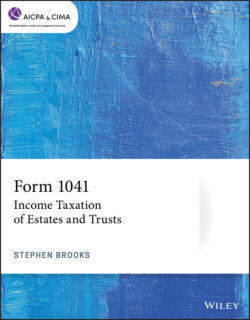Читать книгу Form 1041 - Stephen Brooks - Страница 40
На сайте Литреса книга снята с продажи.
The administration process Overview
ОглавлениеAfter the death of an individual, the executor of the estate as named in the will, or in the case of an individual who dies without a will, the estate administrator, is generally charged with taking control of the decedent's assets, paying the decedent's debts and expenses including inheritance taxes, and finally distributing the remaining assets under the terms of the will, or intestate law if there is no will.
This period of administration or probate begins with the probate of the will and the appointment of the individual or entity named in the will as the estate executor. Probate of the will generally involves presentation of the document to the Register of Wills. If someone wishes to contest the validity of the will, he or she must do so within a limited time period after the will is presented for probate.
If someone dies without a will, he or she are said to die intestate. In that case, the court will appoint an administrator to administer the estate. The administrator is typically the decedent's closest living relative.
